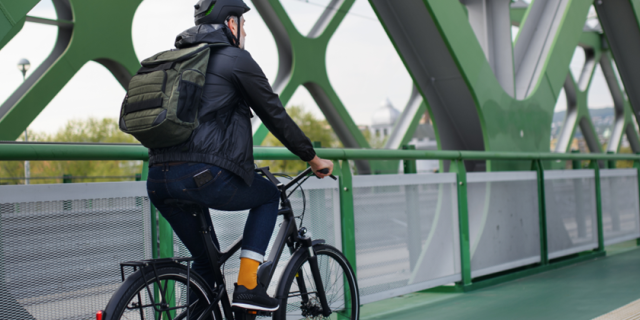Arval Mobility Observatory is pleased to share with you an overview of financial incentives available for corporate bike leasing across several countries in Europe. 7 EU countries have already put in place tax-effective plans to support corporate bike leasing.
You can check each country by selecting it on the list below.
The information presented in this synthesis has been collected in July 2025, and published in September 2025.
-
France
France
French companies that provide bicycles to their employees can benefit from a tax deduction up to 25% of the expenses incurred for any 3-years rental (purchasing, renting, regular maintenance, insurance included). To benefit from this tax deduction, the bikes must be made available to employees with employer coverage ranging from 100% to 70% of the cost of the service or the purchase.
The French social contribution agency (URSAFF) explicitly provides a full exemption of income tax and social security contributions for company bicycles, even when they are used for personal purposes.
In addition to direct provision, some companies offer bicycles through a salary sacrifice model. In this arrangement, the employee voluntarily agrees to reduce their gross salary in exchange for a leased bicycle. This enables the employer to offer the service without any additional cost, while the employee benefits from tax and social charge savings. In practice, this results in a net cost reduction of at least 30% compared to a traditional purchase. For the employer, it’s a budget-neutral way to promote low-carbon mobility.
-
United Kingdom
United Kingdom
UK companies and their employees can benefit from the “Cycle to Work” Scheme. The Cycle to Work scheme follows the salary sacrifice model.
Salary sacrifice is where the employee agrees to give up part of their pre-tax salary in exchange for a benefit from their employer. In this case, the hire of a cycle for active travel and/or safety equipment.
-
The Netherlands
The Netherlands
In the Netherlands, it is very interesting for employers to offer a bicycle program to their employees because of the gross-net fiscal advantage.
This leads to a benefit of around 30-35% for the employee compared to buying a new bike. Since the monthly lease amount is deducted from the gross salary of the employee, the gross salary is lower during the period of the lease contract.
Because of this, the employer can contribute less to pension schemes, social insurance (unemployment etc.), since these amounts are based on the gross salary of the employee.
Altogether, this makes an employer contribution of around 25€ per month effectively cost-neutral for the employer.
-
Belgium
Belgium
Bike leasing (including its accessories, maintenance, and storage) is considered a non-taxable benefit in kind, as long as the employee uses it regularly for commuting purposes (10–20% of home-work trips).
For employers, all costs related to the acquisition, maintenance, and repair of the company bike are tax deductible (including installing showers, changing rooms, and bike storage facilities).
Furthermore, employers are exempted from social contribution. There are no employer social charges on the benefit
Employees may receive a bicycle mileage allowance. As of 2024 (tax year 2025), the tax-free allowance can be up to 0.36€/km, max 3,610€ per year. If the budget is exceeded, the surplus is considered taxable salary. Both the company bike and the allowance are exempt from social security contributions, provided the bike is used for commuting.
The bicycle may also be used for private purposes without any tax impact, as long as it is not used exclusively for private use.
-
Germany
Germany
The Company Bike program in Germany primarily operates through salary conversion. In this model, employees lease bicycles or e-bikes via their employer, with the leasing costs deducted from their gross salary. This arrangement reduces the employee’s taxable income, leading to significant tax and social security savings. Additionally, the private use of the company bike is taxed at a favorable rate of 0.25%
There are two ways for companies to settle the company bicycle:
- Salary Conversion (most-common):
- The employee pays for the lease through a deduction from their gross salary.
- This reduces their taxable income and social contributions
- The employer acts as the lessee but passes the cost to the employee.
- The employee benefits from tax savings, often 30-40% compared to buying at the bike privately
- Salary Supplement (less common but can be used as perk for executives, retention cases or HR strategy reasons):
- In this case, the employer pays for the bite lease in addition to the employee’s salary
- There is no salary deduction, and the bike is given as non-cash benefit
- The monetary benefit is taxable for the employee - but under favorable tax rules:
- Only 0,25% of bikes list price per month
- Tax-free if the bike is only used for commuting
-
Portugal
Portugal
Employers can provide e-bikes or transportation subsidies to employees tax-free, provided certain conditions are met:
- The e-bike must be used primarily for commuting between home and work.
- It must be supplied by the employer and not transferred in ownership to the employee.
- The bike must be used regularly, and not exclusively for private use.
Under these conditions, the bicycle is considered a non-taxable benefit in kind, and both the value of the bike and any related commuting allowances are exempt from personal income tax and social security contributions.
Businesses investing in green mobility solutions, including e-bikes, can benefit from Corporate Income Tax (IRC) deductions.
The standard IRC rate in Portugal is 21%, and specific investments in sustainable transport may be eligible for enhanced deductions or credits (e.g., bike leasing or charging infrastructure).Additional local and municipal incentives may also be available depending on the region. Companies installing charging infrastructure for e-bikes can receive financial support of up to 800€ for equipment and 1,000€ for electrical installation per parking spot, covering up to 80% of costs.
-
Sweden
Sweden
For the employer, offering bikes can be more cost-effective than equivalent salary increases, as the first SEK 3,000 per year per employee is exempt from social security charges and payroll tax reporting is simplified within the allowed threshold. The taxable benefit is calculated based on the bike’s estimated lifespan, service costs, and depreciation.
Employees using an employer-provided bicycle for private use are subject to taxation, but an employee-tax exemption applies for the first SEK 3,000 per year, provided certain conditions are met. The exception only applies if the market value of the bicycle does not exceed SEK 15,000, and the benefit is offered to all permanent employees under equal terms.
If the employee pays from their net salary, the taxable benefit decreases, but gross salary deductions do not reduce the benefit value.
Legal Disclaimer
Whilst every care has been taken to ensure the accuracy of this synthesis of changes to statutory taxation and the associated mechanisms evolutions in Europe (the “Synthesis”), , Arval Service Lease, through its Arval Mobility Observatory ( “ARVAL AMO”) does not give any representation or warranty as to the legal, regulatory, tax or accounting implications of the matters referred to in this Synthesis nor for the accuracy of the information provided herein. This Synthesis is provided for information only. Thus, this Synthesis cannot be assimilated as a tax advice /recommendation issued by Arval AMO. Therefore, any recipient of this Synthesis should take independent advice where necessary. In this respect, ARVAL AMO is not responsible or liable for any liability, loss, claim, cost, or expense that could be incurred by any recipient as a result of relying on any information contained in this Synthesis.














